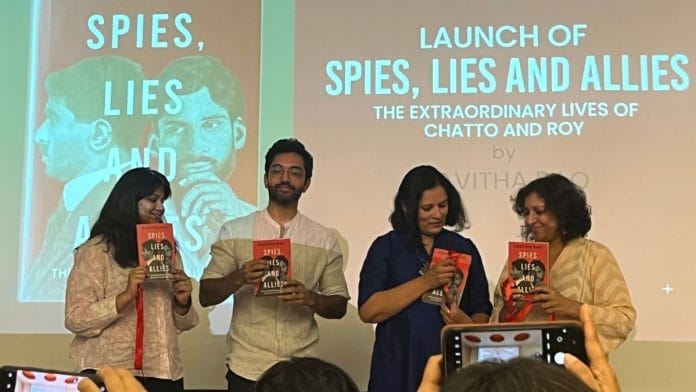New Delhi: History writing has a template. So-called heroes are glamourised––historians and non-historians sift through their lives for the heroic, conveniently neglecting what doesn’t suit the narrative. Meanwhile, other figures are simply there, doomed to non-existence. It’s a historical wrong, and author Kavitha Rao is taking a stab at correcting it.
Her latest book, Spies, Lies and Allies, unveils the trials and tribulations of MN Roy, a founding member of the Communist Party of India, and Harindranath Chattopadhyay, or Chatto, brother of Sarojini Naidu. At the book’s launch at Delhi’s Goethe-Institut on 20 March, Rao delved into her penchant for writing the historically under-represented, and trimmed the colourful lives of Roy and Chatto into an hour–long conversation with historian Manu S Pillai.
“We’re obsessed with the great heroes, and other characters fall by the wayside,” said Rao. “They (Roy and Chatto) failed with so much passion, conviction, and strength. But they were forgotten because they weren’t part of the reigning dispensation.”
The duo was part of a group of revolutionaries who spent the majority of their lives abroad––first to galvanise foreign support for the independence movement, and then as exiles. Chatto was ultimately killed by Joseph Stalin during the Great Purge. Meanwhile, Roy managed to return to India and toyed with various ideologies––before settling on what he called radical humanism.
“They travelled the world trying to muster support for the freedom struggle. But then Gandhi came in like a juggernaut and erased everything. They lived lives of quiet desperation,” the author said.
The heft carried by a couple of historical figures, such as Nehru and Gandhi, proved to be too much to withstand––even for those like Chatto and Roy, who lived rather colourful lives, to say the least. They were stubborn in their positioning, had turbulent love lives, and Roy once abandoned a suitcase filled with jewels belonging to Russia’s Romanov family. There’s been no trace of them since.
Also read: Humayun’s Tomb to Golden Temple—how people, food, traditions keep heritage alive
Turbulent lives
Despite leading parallel lives as global revolutionaries, Chatto and Roy could not have had more different upbringings. Chatto grew up in a genteel, aristocratic family in Hyderabad, while Roy was raised in abject poverty.
“They were both competing for the attention and support of the bolsheviks,” said Rao. Although, their efforts didn’t amount to much––thus their legacy of being ‘failures.’
Yet, the revolutionaries’ lives were volatile, filled with adventure and characters who are perceived as winners. At one point, according to the book, Chinese Communist leader Mao Zedong referred to Roy as someone who “talks too much.” Roy also founded the Mexican Communist Party, which consisted of “six men and a calico cat.”
They abhorred religion. Chato used to eat beef in front of Hindus, and pork in front of Muslims. According to Rao, “they had no use for religion.”
What the two also had in common were flawed, toxic relationships with women. Chatto treated his partner, Agnes, as “a domestic slave.” In her autobiography, Daughter of Earth, Agnes describes being raped by a revolutionary. As per some accounts, she was raped by Roy.
“They treated their wives and girlfriends horribly,” said Rao. However, Roy’s second wife, Ellen Gottschalk, was endlessly faithful.
The discussion was limited to vignettes from Chatto and Roy’s lives––but the audience did appear to be curious about these larger-than-life figures. But mostly, they were keen on whether their lives intersected with that of another hero who also spent a significant amount of time abroad––Subhas Chandra Bose.
“Roy completely disagreed with Bose because he was aligned with the Japanese. He didn’t want to exchange one set of imperialists for another,” said Rao, in response to one such question.
Kavitha Rao has a penchant for untold stories. Her previous book narrated stories of India’s first women doctors. But she wanted a change.
“I did not want to be stuck in a box, referred to as a woman writing about women,” she said. “I’ve always wanted to write non-fiction that reads like fiction. And when it comes to their (Chatto and Roy) lives––truth is truly stranger than fiction.”
(Edited by Aamaan Alam Khan)






